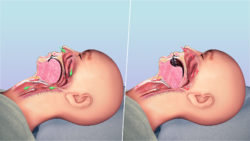Several people think bed-wetting happens only to kids, but it's an issue that can occur with grown-ups also. One might feel embarrassed to wet the sheets, but it's not their fault, it could be due to a medical condition, medicine, or an issue with their bladder.

Causes
Some the key causes are listed below:
- The kidneys may be producing more pee than normal.
- The bladder has difficulty to hold enough urine. When there isn't adequate space in the bladder, the pee may leak.
- Overactive bladder (OAB): The bladder muscles normally squeeze when one is about to pee. In OAB, these muscles squeeze either quite often or at the wrong times.
- Some medicines may irritate the bladder, such as sleeping pills
- It may also be due to a medical condition that affects the body's ability to store and hold urine as an example prostate cancer, multiple sclerosis, etc.
- Blocked urethra which is the tube that carries urine from the bladder
- Enlarged prostate
- Constipation
- Urinary tract stones or infection
- Diabetes
- Obstructive sleep apnea
Symptoms
Most of the people who experience bed wetting, it happens mostly at night. They actually may have any other symptoms except bed wetting at night.
Other symptoms could suggest psychological causes or issues with the kidneys or nervous system and should alarm the family or care provider that this may be more than just routine bedwetting.
- Daytime bed wetting
- Increased frequency, burning sensation or rush on urination
- Straining, or other uncommon symptoms with urination
- Murky or urine in pinkish color, or stains of blood on under garments
- Constipation
- Fecal Incontinence
Treatment for Bed-Wetting
By making a few changes to the daily and nightly routines:
- Retrain the bladder. Go to the bathroom at fixed times during the day and night. Later on gradually increase the time duration between visits to the washroom.
- Don't drink immediately before sleeping. In that case, one would make less urine. Avoid caffeinated drinks and alcohol, that may cause bladder stimulation.
- Use an alarm clock to get up at regular times during night time so one could use the washroom.
- Bed-wetting alarm system: It could be attached to your underwear or some pad on the bed. It will start to alert as soon as one begins to wet the bed.
- In some cases take medicines.
In case medicines and other treatments don't work, your doctor may suggest one these uncommon procedure:
- Bladder augmentation: It's a surgical procedure to increase the bladder size, in order to raise the amount of urine it can hold.
- Sacral nerve stimulation: It helps regulate the bladder which is overactive. A small device is put into the body that transmits signals to nerves in the lower back that help control the flow of urine.
- Detrusor myectomy: It's a major operation that treats an overactive bladder. Either a part or all of the muscles is removed around the bladder to prevent them from contracting at the incorrect times.
Disclaimer: The information in no way constitutes, or should be construed as medical advice. Nor is the above article an endorsement of any research findings discussed in the article an endorsement for any of the source publications.
Sources-
- https://www.emedicinehealth.com/bedwetting/article_em.htm
- https://www.webmd.com/urinary-incontinence-oab/bed-wetting-in-adults#1
Sleep apnea is a very serious disorder in which there is interruption in one’s breathing during sleep. The breathing may be interrupted sometimes hundreds of times during the night. There are two types of sleep apnea. Obstructive sleep apnea and Central sleep apnea.
Read More..










